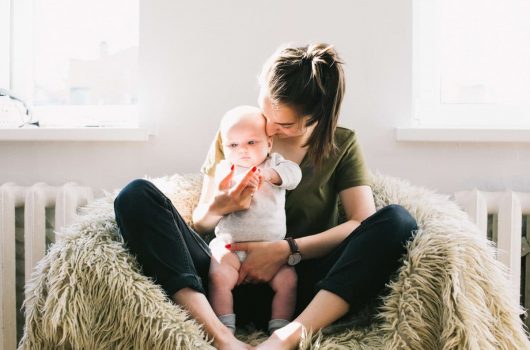A hiccupping baby is an unhappy baby. It hinders the baby’s ability to drink and can be upsetting for parents. We all know how frustrating it can be to have hiccups ourselves. Once they start, it’s hard to get them to stop. You sometimes have hours of hiccups at a time. They can be very exhausting. So, the last thing you want is for your baby to get them. It’s usually inevitable, and parents shouldn’t blame themselves if their baby gets hiccups.
Hiccups are caused by a rush of air into the throat and voice box. The vocal cords constrict in reaction to the rush of air, and the hiccups begin. They are the contractions of your diaphragm.

Babies are prone to getting hiccups while feeding. They might swallow some air with their breastmilk or formula. This will trigger a case of the hiccups. They can also develop hiccups in response to a long bout of crying. Unfortunately, the cures we use as adults don’t work on babies. You can’t tell your baby to drink a lot of water or hold their breath. It’s also not a good idea to give your baby a fright to take their minds off the hiccups! It’s as well bouts of hiccups tend to last only a few minutes before they stop.
Some babies get hiccups often, and the bouts go on for a long time. This is a possible symptom of Gastroesophageal Reflux Disease (GERD). If you feel that your baby’s hiccups go beyond what is normal, see your doctor.
Here are some ideas of things you can do if your baby gets the hiccups:
- Distraction
One of the easiest ways to stop hiccups in their tracks is laughter. Point out something that makes your baby giggle. Pull a funny face. Once the baby starts laughing, the hiccups should stop. Once we focus less on the hiccups, they are likely to go away. - Ride it out
If you leave your baby to hiccup for a minute or two, the hiccups are likely to stop by themselves. If your baby is in no obvious discomfort due to the hiccups, the best intervention is no intervention.

- Feeding approaches
A baby who is fed in a more upright position is less prone to hiccups. If your baby lies too flat during feeding, they’re inclined to take in gulps of air which causes hiccups. After you’ve fed your baby, hold them upright for 20 minutes. This prevents air from being trapped in the esophagus. Hiccups are triggered by too much being ingested during a feed. Consider feeding your baby smaller amounts at smaller intervals. A cranky, hungry baby is inclined to get hiccups from drinking in a hurry.Burp your baby during feeds. If you bottle feed, stop a few times during the feed to burp your baby. Rub their back quite firmly to massage any excess air up and out the throat. After you’ve fed your baby, don’t let them engage in any heavy activity. Bouncing an infant up and down after a feed can bring on a case of the hiccups. - Pacifier
If you use a pacifier, it will help if your baby gets hiccups. The sucking of the pacifier will relax the baby’s body. The diaphragm and esophagus relax as well. Soon the hiccups will disappear. If your baby is hiccupping violently, the pacifier might pop out a few times. Be on hand to put it back. Your baby will soon be off to dreamland, with the hiccups a distant memory - Gripe water
You can give your baby a dose of gripe water to get their hiccups under control. Do this if you can see your baby is in distress because of the hiccups. Consider it if the hiccups don’t stop within the first few minutes. Gripe water contains herbs and water. It is helpful for intestinal complaints. Follow the directions on the bottle and dose your baby accordingly.
